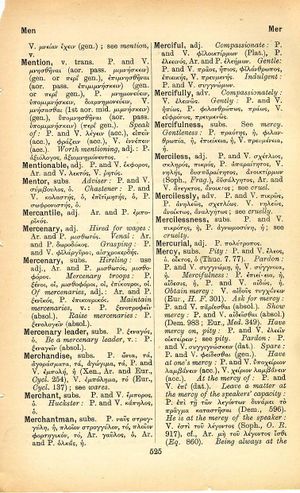mercy: Difference between revisions
θεὸς δ' ἁμαρτάνουσιν οὐ παρίσταται → God doesn't stand by those who do wrong → A peccatore sese numen segregat → Ein Gott steht denen, die da freveln, niemals bei
(CSV4) |
m (Text replacement - "<b class="b2">Eq.</b>" to "''Eq.''") |
||
| Line 13: | Line 13: | ||
<b class="b2">At the mercy of</b>: P. and V. ἐπί (dat.). | <b class="b2">At the mercy of</b>: P. and V. ἐπί (dat.). | ||
<b class="b2">Leave a matter at the mercy of the speakers' capacity</b>: P. ἐπὶ τῇ τῶν λεγόντων δυνάμει τὸ [[πρᾶγμα]] καταστῆσαι (Dem., 596). | <b class="b2">Leave a matter at the mercy of the speakers' capacity</b>: P. ἐπὶ τῇ τῶν λεγόντων δυνάμει τὸ [[πρᾶγμα]] καταστῆσαι (Dem., 596). | ||
<b class="b2">He is at the mercy of the speaker</b>: V. ἐστὶ τοῦ λέγοντος (Soph., ''O.R.'' 917), cf., Ar. μὴ τοῦ λέγοντος [[ἴσθι]]. ( | <b class="b2">He is at the mercy of the speaker</b>: V. ἐστὶ τοῦ λέγοντος (Soph., ''O.R.'' 917), cf., Ar. μὴ τοῦ λέγοντος [[ἴσθι]]. (''Eq.'' 860). | ||
<b class="b2">Being always at the mercy of their assailants</b>: P. ὄντες ἀεὶ τῶν ἐπιτιθεμένων (Plat., ''Pol.'' 307E). | <b class="b2">Being always at the mercy of their assailants</b>: P. ὄντες ἀεὶ τῶν ἐπιτιθεμένων (Plat., ''Pol.'' 307E). | ||
(<b class="b2">I think</b>) <b class="b2">that the virtues of many should not be at the mercy of one man</b>: P. μὴ ἐν ἑνὶ ἀνδρὶ πολλῶν ἀρετὰς κινδυνεύεσθαι (Thuc. 2, 35). | (<b class="b2">I think</b>) <b class="b2">that the virtues of many should not be at the mercy of one man</b>: P. μὴ ἐν ἑνὶ ἀνδρὶ πολλῶν ἀρετὰς κινδυνεύεσθαι (Thuc. 2, 35). | ||
}} | }} | ||
Revision as of 13:57, 7 August 2017
English > Greek (Woodhouse)
subs.
Pity: P. and V. ἔλεος, ὁ. οἶκτος, ὁ (Thuc. 7, 77). Pardon: P. and V. συγγνώμη, ἡ, V. σύγγνοια, ἡ. Mercifulness: P. ἐπιείκεια, ἡ, αἴδεσις, ἡ, P. and V. αἰδώς, ἡ. Obtain mercy: V. αἰδοῦς τυγχάνειν (Eur., H.F. 301). Ask for mercy: P. and V. παρίεσθαι (absol.). Show mercy: P. and V. αἰδεῖσθαι (absol.) (Dem. 983; Eur., Med. 349). Have mercy on, pity: P. and V. ἐλεεῖν οἰκτείρειν; see pity. Pardon: P. and V. συγγιγνώσκειν (dat.). Spare: P. and V. φείδεσθαι (gen.). Have at one's mercy: P. and V. ὑποχείριον λαμβάνειν (acc.), V. χείριον λαμβάνειν (acc.). At the mercy of: P. and V. ἐπί (dat.). Leave a matter at the mercy of the speakers' capacity: P. ἐπὶ τῇ τῶν λεγόντων δυνάμει τὸ πρᾶγμα καταστῆσαι (Dem., 596). He is at the mercy of the speaker: V. ἐστὶ τοῦ λέγοντος (Soph., O.R. 917), cf., Ar. μὴ τοῦ λέγοντος ἴσθι. (Eq. 860). Being always at the mercy of their assailants: P. ὄντες ἀεὶ τῶν ἐπιτιθεμένων (Plat., Pol. 307E). (I think) that the virtues of many should not be at the mercy of one man: P. μὴ ἐν ἑνὶ ἀνδρὶ πολλῶν ἀρετὰς κινδυνεύεσθαι (Thuc. 2, 35).

